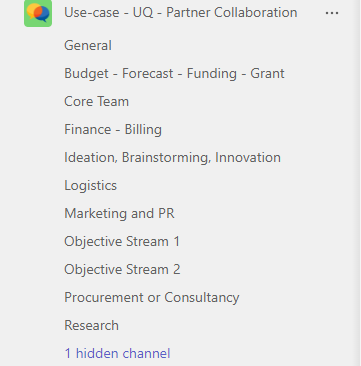How to structure a Team in Microsoft Teams: best practice and examples
Microsoft Teams offers more than meetings and instant messaging – the Teams feature encourages and enables collaboration between people working towards a common goal.
Here’s how to create a Team, as well as some examples of how you might set-up a Team for collaborating with UQ coworkers, for recording and sharing research, or for communicating with external partners.
What is a Team?
Within Microsoft Teams, a Team serves as a collaborative workspace for its members. The Team allows members to communicate and share files in a closed environment. You may be a member of Team for your faculty, or your org unit, or a project that you contribute to.
ITS manages the creation of new Teams. To request a Team, submit an IT Support request.
Each team is made up of Channels. All new Teams come with a General Channel. Every member of the Team will be automatically added to the General Channel, so it is suited to sharing information relevant to all Team members. These can include important announcements, requests for feedback and new member introductions.
Besides the General Channel, Channels are typically dedicated spaces for specific topics. In the Microsoft Teams Partner Collaboration use-case, several Channels have been created to organise the different areas for collaboration. 
These Channels can be:
- standard - open and searchable for all Team members
- private – accessible only to selected Team members
- shared – accessible to both Team members and people outside the Team. Requires an invitation to join.
How should I structure my Team?
How you structure your Team, including the Channels you create, will depend on what the purpose of your Team is.
ITS has produced several use-case examples of how Teams can be setup. You can join these demonstration Teams using the invite codes – how to use invite codes.
Faculty or Org Unit Internal Collaboration
Invite code: 4edp028
The Faculty or Org Unit Internal Collaboration use-case is designed to serve as a central communication hub for the entire faculty or org unit.
The Channels are primarily a mix of project-based work, training and recognition, and org sub-units. There is also the required General Channel as well as a Casual Channel for organising team events.
These Channels are all standard type, but could be made shared or private depending on the relevant work requirements.
Faculty or Org Unit Leadership Collaboration
Invite code: 2q446xp
This use-case is intended as a space for leadership groups to have confidential discussions about their organisation.
By creating a separate team, rather than a private channel in a faculty or org unit Team, the leadership group are afforded more flexibility to create numerous Channels relating to different topics. In the use-case, this includes Channels around employee satisfaction, recruitment, and health and safety.
These channels are all standard – there's no need to make them private as only leadership are members of the Team.
UQ-Partner Collaboration
Invite code: w0qdwie
This use-case is for collaborations between UQ and an external party, such as another university.
People from outside UQ can be invited via their email account to a Team as a guest member. Their experience will be, for the most part, the same as someone from UQ – there are some limited feature and capabilities.
Other demonstration Teams
Beyond the three discussed above, ITS has developed several demonstration Teams.
These Teams can be joined using the following invite codes:
cross-UQ projects/initiatives collaboration - a0k8nfj
research networks - emzhh96
course creation, ideation or innovation - cv6kn7b
Teaching and Learning - o0bismn
boards, committees, sub-committees, forums and communities - rd4bc7n
Microsoft Teams use-cases – summing up
If you found this blog helpful, please let us know - via our feedback form! At the same time, if there’s more you’d like to know about Microsoft 365, share your questions with us and we may address them in future training materials.
For those interested in digital tools adoption at UQ, a Microsoft 365 Change Champions program has launched. The program is intended to build a cohort of Microsoft 365 advocates to help drive engagement with the platform among staff. If you would be interested in joining the program, please complete our EOI form.
